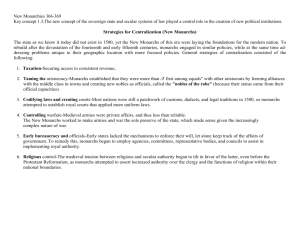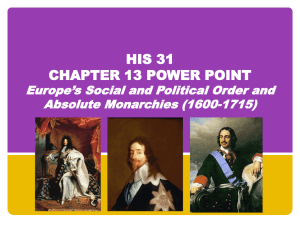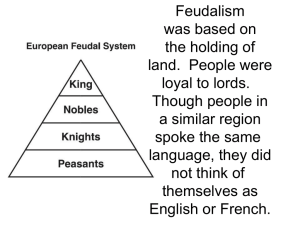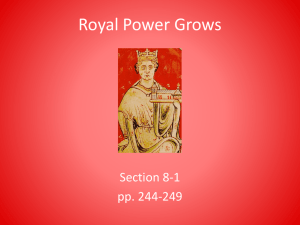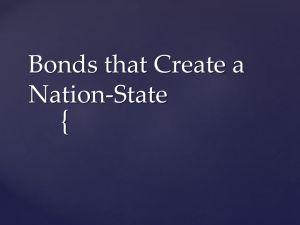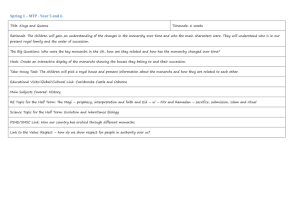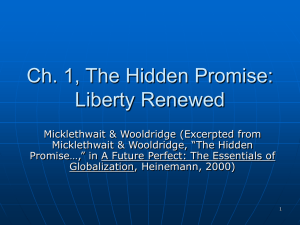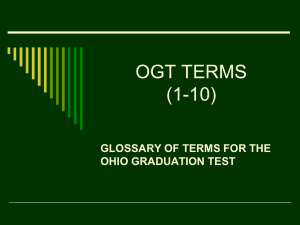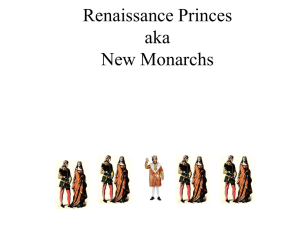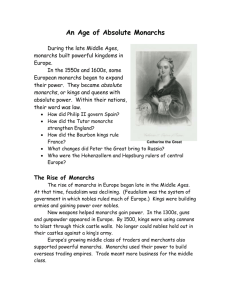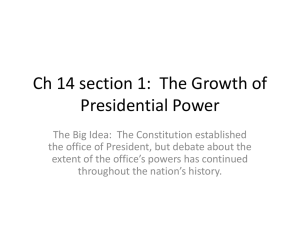Nation-State
advertisement
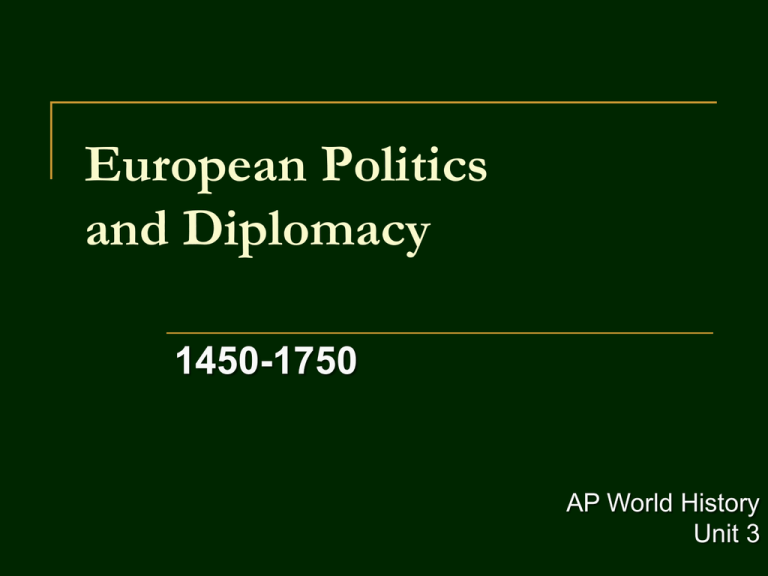
European Politics and Diplomacy 1450-1750 AP World History Unit 3 STATE BUILDING Italian city-states. Flourished with industries and trade. Each with independent administration and army. Levied direct taxes on citizens. More powerful absorbed smallest. France and England Hundred Years' War (1337-1453) Fought for control of French lands. Imposed direct taxes to pay the costs of war. Central government over feudal nobility. English War of the Roses leads to Tudor Dynasty. Louis XI reduces powers of feudal aristocracy. STATE BUILDING Spain united Competition among European states Marriage of Fernando of Aragon and Isabel of Castile. Sales tax supported a powerful standing army. Conquered Granada from Muslims. Seized southern Italy in 1494. Sponsored Columbus's quest for western route to China. Frequent small-scale wars. Encouraged new military and naval technology. Technological innovations strengthened armies. Dynastic Politics Constant search for an heir. Must marry for political advantage. Gave women influence as regents, brides, mother of heir. NEW MONARCHS New Monarchs Taxes and armies strong tool by late 15th century. Feudal powers mixed with new powers to become dominant in society. Developing towards divine right. Monarchs answered only to God, not people. Henry VII of England and Louis XI of France are two best examples. France, England and Spain All three united after long wars. Kings have new, broad powers. Nobles often weakened. New nobles created out of middle classes. NEW MONARCHS Enhanced royal and centralized powers Wealthy treasuries by direct taxes, fines, and fees State power enlarged and more centralized Standing armies in France and Spain Professional bureaucrats loyal only to monarch, not church Nobility status often sold to wealthy merchants to raise funds Reformation increased royal power Kings confiscate wealth, land of the church Kings sell off lands to middle class, making them loyal to state Even Catholic monarchs tended to follow this trend NEW MONARCHS New law courts enhance royal power Kings tend to function above the law English Star Chambers. The Spanish Inquisition, Catholic court of inquiry, founded 1478 Do not require warrants or trials. Intended to discover secret Muslims and Jews Used by Spanish monarchy to detect Protestant heresy and political dissidents French Parliaments reduced to law courts not legislative assemblies. CONTITUTIONAL MONARCHS Constitutional states of England and the Netherlands Divine Right Monarchs limited by war, nobles, and wealthy class. Characterized by Powers limited by constitutions, bills of right, and convention. No one is above the law, property is protected by law. Representative institutions. Rights of oversight, taxation, review, and veto. Merchant classes enjoyed unusual prosperity. Commercial empires overseas with minimal state interference. Dutch constitutional monarchy evolved out of religious wars. Constitutional monarchy in England evolved out of a civil war. ABSOLUTE MONARCHS Absolutism in France, Spain, Austria, and Prussia Based on the theory of the divine right of kings Spain and Austria united by Hapsburg marriage. Cardinal Richelieu Relied on bureaucrats and professional armies. Restricted power of aristocracy, legislatures, and church Relied on mercantilism to generate taxable wealth. French chief minister 1624-1642. Crushed power of nobles. Prussia began to rise in late 17th century Based on absolutism and army. Eventually will unite Germany. EUROPEAN STATE SYSTEM The Peace of Westphalia,1648 Ended the Thirty Years' War. Began system of independent sovereign states. Abandoned notion of religious unity. Did not end war between European states. The balance of power No state allowed to dominate others. Diplomacy based on shifting alliances. No permanent alliances. Only permanent interests. Religion unimportant to determining alliances. Destroy no nation. Make no permanent enemies. EUROPEAN STATE SYSTEM Military development costly and competitive New armaments. Cannons and small arms. New military tactics. Extremely intricate fortifications. Professional navies with modern warships and weapons. China, India, and the Islamic states did not keep up with Europe. Small, well-trained armies become critical. THE NATION-STATE Nation-State Ethnic group with common language, culture Shared history, traditions Shared institutions (faith, politics) Occupying a common territory Ruled by a common government Government’s job Insure domestic tranquility and happiness Assumed many of the Church’s old social roles Multiple ethnic groups destroy nation-state THE NATION-STATE Creation of a Nation-State Ethnic group with common language and culture. Shared history and traditions. Shared institutions. Occupying a common territory. Ruled by a common government. Government’s job: Example: faith and/or politics. Insure domestic happiness. Assumed many of the church’s old social roles. Multiple ethnic groups destroy nation-state. THE NATION-STATE Belief in Nation-state became new popular ideology Nationalism is love of your nation above others. Originated as an elite idea of the aristocracy and educated elite. Loyalty to state and king more important than loyalty to the church and pope. Martin Luther addresses the “German People”. King James had the Bible translated into English French have Joan of Arc fighting for France against English. Dutch and Portuguese revolt against foreign Spanish rule.
